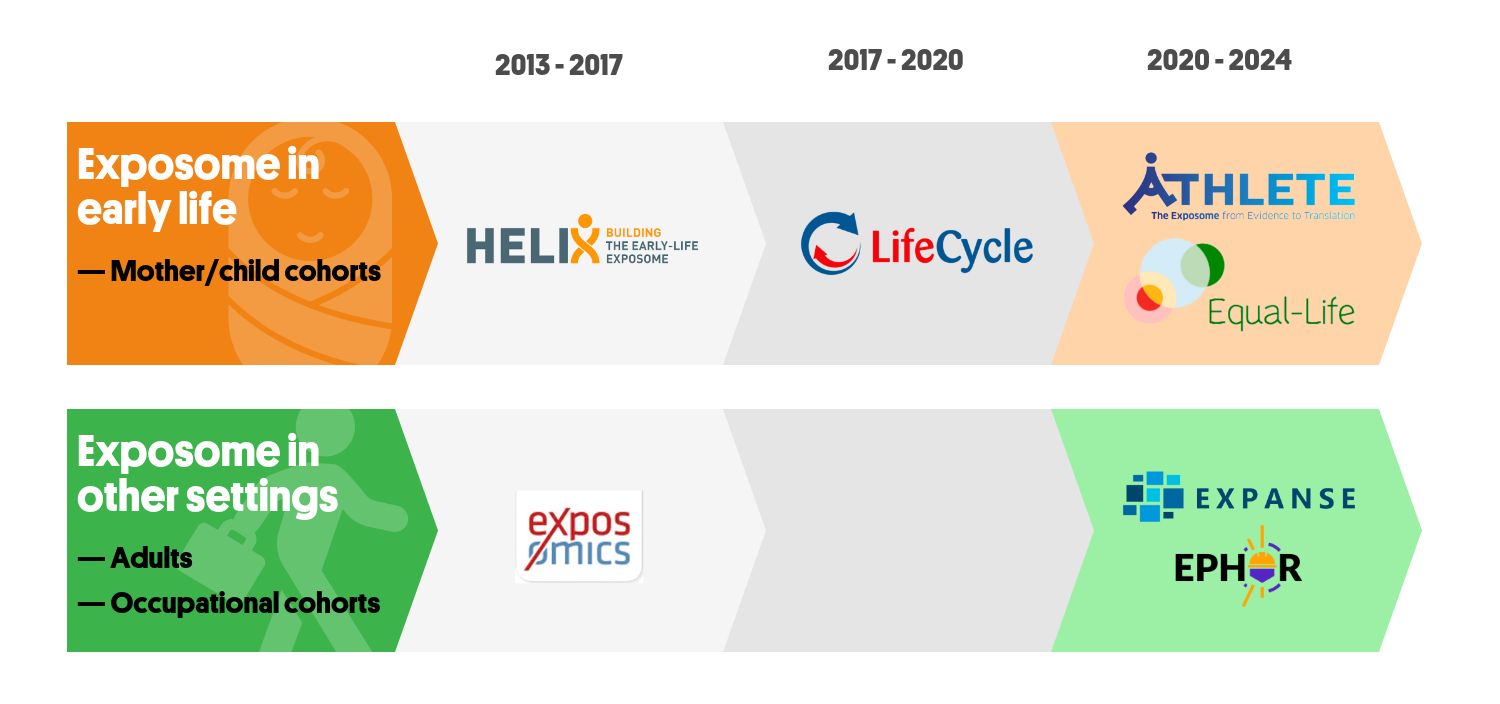Environmental hazards account for a probably large, but not well characterised, proportion of the burden of disease. The exposome, described as "the totality of human environmental exposures from conception onwards", recognizes that individuals are exposed simultaneously to a multitude of different environmental factors and takes a holistic approach to the discovery of etiological factors for disease. The exposome’s main advantage over traditional ‘one-exposure-one-disease’ study approaches is that it provides an unprecedented conceptual framework for the study of multiple environmental hazards (urban, chemical, lifestyle, social) and their combined effects.
Promises of the Exposome
- Holistic → Complex system, multiple exposures, mixtures.
- Life-course → Temporal sequence.
- New tools/technology → Coverage and accuracy of exposures (omics, sensors, etc.).
- Internal exposome → Early biological responses.
- Untargeted discovery → Unknown exposures.
The characterisation of the exposome and its related health effects requires continuous innovation in the development of tools and methods, including for exposure assessment, integration of omics markers, data infrastructures, and complex data analysis. Interdisciplinary collaboration is key to this.
ISGlobal has established itself at the forefront of international exposome research through its coordination of, and partnership in, several large international exposome projects funded by the European Commission (see projects).
ISGlobal’s Exposome Research Hub brings together a cross-faculty network of researchers across the following programmes:
- Air Pollution and Urban Environment
- Climate and Health (AIRLAB)
- Childhood and Environment
- Non-communicable Diseases and Environment
- Radiation
This in order to promote excellence, innovation, and collaboration in exposome research, and to meet the training needs of researchers in this field.
Large Exposome Projects at ISGlobal

Lines of Research across ISGlobal Programmes
- Internal exposome, chemical exposures, endocrine disruptors.
- External exposome, urban environment (e.g. air pollution, noise, built environment including green spaces), GIS-based exposure characterization, and modelling and measurement of exposures.
- Working-life exposome, harmonisation of occupational exposure assessment throughout Europe (EuroJEM).
- Biological responses/internal exposome through omics technologies, epigenetics, transcriptomics, inflammatory proteins, allostatic load, accelerated ageing, gut microbiome, metabolomics.
- Cohort implementation and harmonization: mega-cohorts for occupational health, longitudinal mother-child cohorts, adult cohorts, mega-cohorts from administrative data.
- Exposure and health: mental health and neurodevelopment, cardio-metabolic health, obesity, respiratory health.
- Bioinformatics for multi-omics integration, federated data analysis (analyses when data are stored on federated databases or, more generally, in different repositories, e.g. Datashield).
- Advanced data modelling for exposure mixtures and causal inference.
- Characterization of the air from urban and rural environments: determination of physical properties of particles (from coarse to ultrafine particles), analysis of chemical (metals, non-metals, etc.) and biological (bacteria, fungi and viruses) composition. AIRLAB: core facility laboratory.
Our Team
Hub Coordinator
-
 Lea Maitre Assistant Research Professor
Lea Maitre Assistant Research Professor
Hub Project Manager
-
 RODNEY ORTIZ Project Manager
RODNEY ORTIZ Project Manager
Hub Committee
-
 Sofya Pozdniakova Postdoctoral Researcher
Sofya Pozdniakova Postdoctoral Researcher -
 Cathryn Tonne Research Professor
Cathryn Tonne Research Professor -
 Michelle Turner Associate Research Professor
Michelle Turner Associate Research Professor -
 Martine Vrijheid Research Professor and Head of the Environment and Health over the Lifecourse Programme
Martine Vrijheid Research Professor and Head of the Environment and Health over the Lifecourse Programme
Projects
The BEGIN study
The Bipolar Exposome-Gene Interaction Naturalistic (BEGIN) study
EXPANSE
EXposome Powered tools for healthy living in urbAN SEttings
ATHLETE
Advancing Tools for Human Early Lifecourse Exposome Research and Translation
EPHOR
Exposome Project for Health and Occupational Research
HELIX
Novel tools for integrating early-life environmental exposures and child health across Europe
LIFECYCLE
Early-life stressors and LifeCycle health
EXPOsOMICS
Other projects
B-COOL@HOME
Cooling older adults' homes in Barcelona
AM-MENTAL
What happens with your mental health when your supervisor is an algorithm?
e-QuoL
e-health tools to promote Equality in Quality of Life for childhood to young adulthood cancer patients, survivors and their families
B-Triage
Una prueba en el punto de atención para la estratificación del riesgo de los pacientes febriles basada en los niveles de sTREM-1
El microbioma intestinal y la disrupción circadiana
Un estudio epidemiológico molecular sobre enfermedades cardiometabólicas y salud mental
IHEN
International Human Exposome Network
EXPONIT
Analysing and studying how night shift work affects workers' circadian rhythms and health
FINDOOR
FTIR spectroscopy for real-time detection of bacterial outbreaks and the rapid identification of pathogenic serotypes, relapsing infections and antibiotic resistance
















